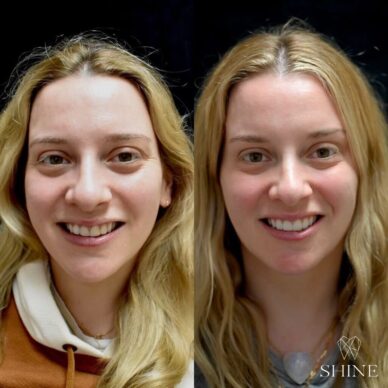We often hear how Botox can help smooth wrinkles and fine lines to achieve a youthful glow. But did you know it can also address teeth grinding? Teeth grinding or bruxism (or teeth clenching) is a condition many people have, and it can cause problems with your mouth, jaw, teeth, and facial muscles.
What Are Botox Injections?
Botox (botulinum toxin) is made from a toxin produced by the bacterium Clostridium botulinum. It’s the same toxin that causes a deadly type of food poisoning called botulism. But in Botox treatments, doctors use controlled doses to block signals from the nerves to the muscles. So when it’s injected into a specific muscle, that muscle can no longer contract. This causes wrinkles to relax and soften, and in bruxism treatments, it helps to reduce muscle stiffness or spasms.
The procedure itself is pretty quick (less than 10 minutes) and doesn’t usually require anesthesia. The healthcare provider uses a thin needle to inject small amounts of Botox into muscles like the masseter or temporalis muscles. You should start seeing Botox’s effects within 7 to 14 days after your treatment.
It’s important to remember that the effects of Botox are temporary. Over time, your muscles will gradually return to their normal function, and wrinkles or muscle stiffness may begin to reappear. As such, repeated treatments are often necessary to maintain the results.

What Is Bruxism?
Bruxism is a medical and dental issue where you unconsciously grind, clench, or gnash your teeth. In some cases, it’s mild and doesn’t require treatment. But it can become frequent and severe enough to cause headaches, facial pain, lockjaw, damage to your teeth, and other problems.
What Causes Bruxism?
Teeth grinding occurs while you’re awake (awake bruxism) or asleep (sleep bruxism). Many factors can cause it, but the most common is stress and anxiety. Many people unconsciously clench or grind their teeth when pressured, tensed, or uneasy.
Another potential cause is an abnormal bite or misaligned teeth. When your teeth don’t fit together perfectly, it can lead to grinding or clenching. Sleep disorders, such as sleep apnea, can also trigger bruxism.
Furthermore, lifestyle habits like drinking alcohol, smoking cigarettes, using recreational drugs, and consuming excessive caffeine have been linked to sleep bruxism. Certain medications, particularly selective serotonin reuptake inhibitors (SSRIs), a type of antidepressant, can also contribute to this condition.
In some cases, bruxism may be associated with other medical conditions or neurological disorders, like Parkinson’s or Huntington’s disease. It’s always important to seek professional advice if you suspect you might be experiencing bruxism.
How Do Botox Injections for Bruxism Work?
To treat bruxism, Botox is injected into the masseter muscle located in the jaw and the temporalis muscle in the scalp. Note that masseter muscles are jaw muscles that allow you to close your jaw. Botox for bruxism works by limiting these muscles’ movement, reducing the unconscious grinding and clenching that can lead to tooth damage and jaw pain.
But as mentioned, while Botox as a jaw-clenching treatment can reduce these symptoms, it doesn’t cure bruxism.
It offers temporary relief, usually for three to six months. After which, further treatment would be necessary. However, many patients find this approach preferable to traditional therapies like mouthguards or more drastic measures like surgery.
Benefits of Botox Injections for Bruxism
Botox for locked jaw and teeth grinding can provide the following benefits:
- Muscle relaxation. Botox works by relaxing the overactive muscles, specifically the masseter muscle, in the case of bruxism. This helps to reduce jaw tension and clenching.
- Pain relief. Many people with bruxism experience chronic jaw pain and headaches. By easing muscle tension, Botox can alleviate these painful symptoms.
- Prevention of dental damage. Constant grinding can wear down your teeth, potentially leading to long-term damage. Botox can help prevent this by reducing the intensity and frequency of grinding.
- Improvement in sleep quality. Bruxism often disrupts sleep. With reduced grinding and clenching, patients may experience improved sleep quality.
- Non-invasive treatment. Botox treatment for bruxism is non-invasive and typically takes just a few minutes, making it a convenient option for many patients.

What to Expect After Botox for Teeth Grinding
Here are aftercare tips after undergoing jaw botox for teeth grinding:
- Avoid touching the injection area. Firstly, try not to touch or rub the injection area for at least 4 hours post-treatment. This helps prevent the spreading of Botox to unintended muscles. Also, it’s recommended that you stay upright for 4 hours following the procedure, so avoid napping.
- Avoid strenuous exercise for the first 24 hours. Strenuous exercise is also a no-go for at least 24 hours after treatment. While it’s fine to do light activities like walking, you’ll want to avoid anything more intense to prevent any potential complications.
- Avoid panicking when you see redness or swelling. If you notice any redness or swelling, don’t panic. This is normal and should subside within a few days. Applying an ice pack can help with this. And remember, alcohol and nicotine should be avoided for at least 24 hours after treatment.
- Be realistic. Remember that the full effects of bruxism Botox aren’t usually seen immediately. It could take up to two weeks to notice a significant reduction in teeth grinding or jaw clenching.
Can Dentists Administer Botox Injections for Bruxism?
Dentists can administer botox injections for bruxism and other dental problems like temporomandibular joint (TMJ) disorders. But a dentist who offers this service must first undergo extensive training to learn how to use it as a dental treatment.
They may be a preferable choice for these types of procedures over a medical doctor due to their specialized knowledge and expertise in the oral and maxillofacial areas like the face, mouth, and jaw, which are directly affected by bruxism. Make sure to choose a reputable and experienced dental clinic in your area for your botox injections for teeth grinding.
Final Thoughts
Botox injections can be an effective treatment for bruxism but don’t cure it. They can reduce the severity and frequency of bruxism, but practicing good oral hygiene and attending regular dental check-ups is still essential. If you suffer from bruxism, discuss all your treatment options with your dentist or doctor to decide what is best for you. With proper treatment, it can be managed so that it doesn’t have a major impact on your daily life.
Take the first step towards a healthier, more comfortable life and book a consultation today. Call us now to learn more.
Book now



